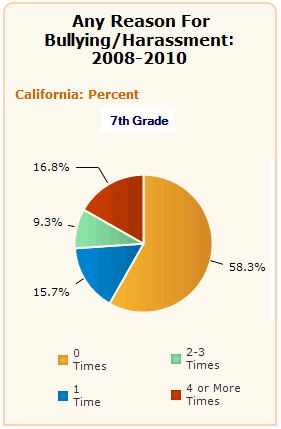Data from Student Survey Indicate Bullying, Harassment Widespread in California Schools
More than four in ten 7th grade students surveyed in California report being bullied at school, according to 2008-10 data now available on kidsdata.org and its companion Query CHKS. Moreover, there is little evidence that the prevalence of harassment has declined among 7th graders since 2006-08, and there have been only small declines among 9th and 11th graders.
These data come from the California Healthy Kids Survey (CHKS), a survey of students developed and administered by WestEd for the California Department of Education (CDE) and used by schools throughout the state. Student reports of bullying and harassment are available at the school district and county level, providing a local lens on an issue of statewide concern and focus. Data also are available at the state level.
Since 2010, CDE, WestEd, and the Lucile Packard Foundation for Children's Health have partnered to make CHKS data available on kidsdata.org, allowing users to create graphs, maps, and tables comparing key CHKS data by demographic groups and across districts and counties in California.
Greater attention needs to be paid to reducing harassment in schools. CHKS data also show that harassed students are at greater risk than non-harassed students of a wide range of detrimental behaviors, emotions, and experiences, including poorer school attendance, school connectedness, perceived safety, and mental health.1
Top-line Findings from the 2008-10 CHKS Data Include:
More than 40% of California 7th graders report being bullied at school.
According to 2008-10 data, 42% of 7th graders, 35% of 9th graders, and 28% of 11th graders in California public schools report being bullied or harassed at school at least once in the past year. About 40% of bullied students within each grade level report it happened four or more times. Compared to 2006-08 data, these results are level in 7th grade but there were small declines in 9th and 11th grades (two and three percentage points, respectively).
Students who are less connected to their schools more often report bullying.
“School connectedness” refers to students feeling treated fairly, close to people, happy, part of, and safe at school. Secondary students with low levels of school connectedness more often reported being bullied or harassed at school than students who felt more connected to their schools. One in four students (26%) with low levels of school connectedness reported being bullied or harassed four or more times in the past 12 months, compared to one in 10 students with high levels of school connectedness.
Most common specific reasons for bullying are race/national origin and sexual orientation.
When youth are bullied or harassed at school, the most common specific reason cited is their race or national origin. In 2008-10, 19% of 7th graders, 17% of 9th graders, and 14% of 11th graders reported at least one bullying incident for this reason in the past year. Among African American/Black students, 25% reported they had been bullied because of their race, followed by 24% of Asian American and 23% of Native Hawaiian/Pacific Islander students.
Sexual orientation is the second most common specific reason students say they were bullied: 12% of 7th graders, 10% of 9th graders, and 8% of 11th graders had experienced at least one incident in the past year related to sexual orientation.
These results are consistent with those of 2006-08, with only one small decline of two points among 11th graders for being bullied at least once because of their race/ethnicity.
Find Bullying Data for Your Community>>
Helpful Links
Use These Data in Your Work
These free CHKS data are available at the school district, county and state level, and can be used by community organizations, parents, government agencies, foundations, media, researchers, and others. You can use these data, as well as related measures of youth safety and emotional and behavioral health, in reports, presentations, proposals, policy and advocacy work, program planning, and other efforts.
Also See: School district-level CHKS data reports can be downloaded at http://chks.wested.org/reports or http://dq.cde.ca.gov/dataquest.
1. Greg Austin, Jonathan Nakamoto, & Jerry Bailey. (2010). Harassment among California students, 2006-08. CHKS Factsheet #10. Los Alamitos: WestEd. Available for download at http://chks.wested.org/resources/FACTSHEET-10.pdf. |

In 2008-10, 42% of 7th graders in California reported being bullied or harassed at school in the past year. Percentages were lower among 9th and 11th graders; 35% of 9th graders and 28% of 11th graders reported being bullied.
|

